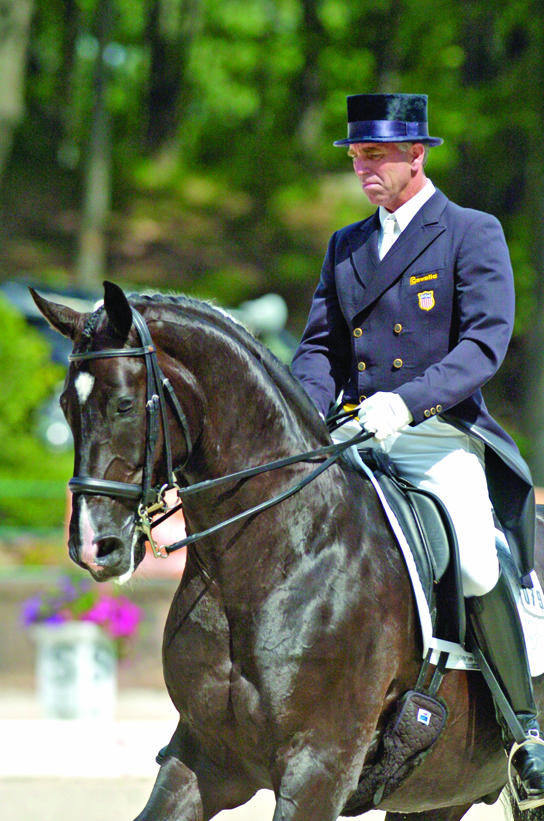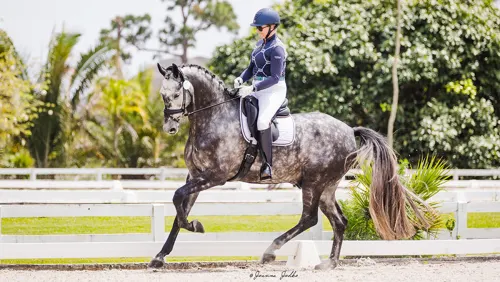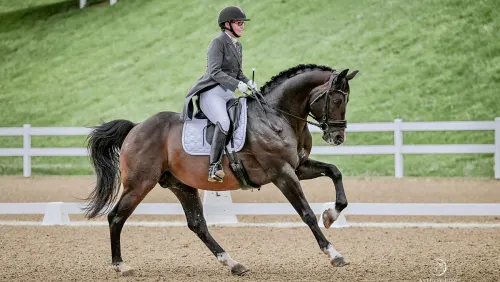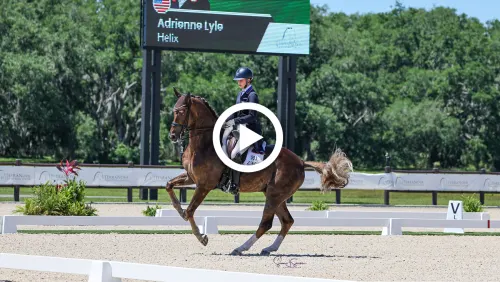Delegates to the U.S. Dressage Federation Board of Governors are scheduled to vote on whether or not to have a national dressage championships today, Dec. 2, at the 2011 Adequan USDF National Convention in San Diego. Chronicle staffer Lisa Slade is at the meeting and will update how the vote went at the end of the day.
At the 2010 Adequan/U.S. Dressage Federation National Convention, dressage enthusiasts from around the country engaged in a spirited discussion over a potential national championship for dressage in an open forum. An hour later, delegates and members moved to the Board Of Governors meeting where the topic came up again.
“We just decided in the last meeting that there was great support for a national championship, and we want to look into hosting one,” said one delegate.
“No!” responded another. “We decided we didn’t want a national championship!”
“That’s exactly what the situation is and what we’re facing,” said USDF President George Williams with a laugh. “It’s strong feelings all around. There does not seem to be any clear cut right or wrong in this. The numbers seem to be pretty even both ways.”
An Ongoing Conversation
This wasn’t the first year that the topic of a national championship drew heated debate at a USDF Convention. According to Janine Malone, USDF secretary, member of the U.S. Equestrian Federation Dressage Committee and chairman of several ad hoc national championship committees, the idea was first introduced more than 15 years ago.
“When we first met to put together the regional championship program [which was implemented in 1993], the idea was that it would feed into a national championship in a few years time,” said Malone, Zebulon, N.C. “I was on a sub-committee in 1997 to go ahead with specific plans for that. We had lots of meetings and got a plan and an outline on how to put it together. We made a presentation to the USDF board in 1997, and we got enthusiastic support for it.”
But the national championship soon encountered its first of many roadblocks. Because the USEF owns the rights to all three Olympic discipline national championships, a U.S. Olympic Committee requirement, a feasibility study had to be conducted with USDF and USEF. That study happened in 2001, and it found some unexpected problems.
“Not all the regional championships were run as well as they should have been,” Malone said. “They had issues that needed to be worked out and needed more local support within the regions to make them the same standard. There were all these discussions about what to do, what not to do. The thing kind of was on the backburner for a few years, and the national championship subcommittee was disbanded.”
When it came up for serious discussion at the annual convention in 2008 with a different subcommittee, it was again put on hold. But this time it was because of the economy. Though $2 from every $10 fee that competitors pay to qualify for regional championships had been accumulating in a national championship fund, now containing more than $600,000, delegates decided that the $2 should instead go to the general fund to help with budget shortfalls.
That motion was passed again in 2009 and in 2010, but Williams said he wants a solution to the question sooner rather than later. He hopes for a vote at next year’s annual meeting.
“I asked the executive board to look at it and see if we can make a recommendation one way or the other,” he said. “If the economy has at least stabilized, it seems like it may be time to really look at it and make a decision. We’ve been talking hypothetically for so long.”
ADVERTISEMENT
The next step is gauging interest through a survey of USDF members who would have qualified for the national championship.
“We’re not sure of all the specifics of the survey, but the general thought is through this we would target those riders who would actually be qualified and would be eligible to compete,” Williams said. “We’re not sure if we’re going to target the top four or five placings at regionals, or do a more general survey of people who qualified for the regional championships. We want to really try to get a feel from those who would be eligible, not just of the general dressage community, who would do it.”
Hammering Out The Details
Some components of a national championship have stayed the same throughout all the discussions—riders will qualify through the regional championships, and it will be funded by the regional championships. But other things have changed as the project has undergone numerous revisions.
At times, the plan was for a championship for all riders at all levels; for just fourth level and under; for adult amateurs only; and for adult amateurs and open riders. Most proposals have placed it in November, but it could also happen early in the spring. The location has also moved around, and the current plans suggest the Kentucky Horse Park in Lexington for at least the first few years.
But nearly every decision so far has proved contentious and challenging. Should USDF host a national championship for high performance riders when there is already the Collecting Gaits Farm/USEF Dressage Festival Of Champions every year for Grand Prix, Intermediaire I, young riders, juniors and young adults? The Markel/USEF National Young Horse and USEF Developing Horse Championships could also be seen as potential competition for a national championship.
“How can you have two national champs at some levels?” said Williams. “The thought is to make it more geared towards adult amateurs at Grand Prix level, say. The last working group, which I was not part of, went back towards it being adult amateurs, open and possibly juniors as well. It seemed like the professionals were taken care of, the adult amateurs are the group who don’t have a championships, but you’re more likely to get adult amateurs if their trainers have a reason to come as well.”
West Coast riders don’t think a championship held on the East Coast every year is a fair solution, and if few riders make the trip it won’t be a true national championship.
“I think most of the people in California are not interested if we’re doing it for the amateur rider,” said Terry Wilson, Region 7 director. “The timing is very difficult because of the weather problems with transporting horses across the country in November. More people would be interested earlier in the year, but then it runs into conflict with the regional finals. There was some discussion about having it in the spring, but then people felt their horses would be at the next level. All these issues present themselves.”
East Coast riders have issues with the proposed time of year for the championship too. No one wants to compete when it’s freezing cold, and because some regional championships aren’t held until November, they would have to be moved up. Working out that logistical detail could take a few years. Even more problematic, if amateur riders don’t know if they’re qualified for nationals until after regionals, how could they take off work or arrange travel?
“Regional championship dates are selected a year and a half before the show,” Malone said. “That’s to allow getting the dates and hiring judges and officials. Some regionals would have to move, so that’s at least two years out. Moving would be a big issue for some regions. Because of the heat, they don’t want to be too early.”
“We have to understand and appreciate that people might not be able to get the time off from work and get away,” added Williams. “If they do a regional championship, they have to travel to qualify and travel for the [regional] championship. They need a week off, and then they even don’t know if they’re going to need a week off, or more, for national champs. From a practical point of view, there are lots of issues like that.”
And others have a hard time throwing support behind something that hasn’t been fully researched.
ADVERTISEMENT
“I would love to see a thoughtful consideration of all the challenges and what the goals are, to see if a system could be devised that would be meaningful to the industry based on the unique and unusual nature of the competitive dressage world,” said Peggy Klump, FEI-level rider and president of the California Dressage Society.
Do People Want It?
Beyond all the logistical challenges, the question still remains whether riders want a national championship. And if one is held, will enough show up to make it profitable?
Yvonne Barteau, Grand Prix rider and trainer based at KYB Dressage in Maple Park, Ill., has also shown Arabians, Quarter Horses and Friesians, and she said those breeds’ national championships could serve as an excellent model for USDF.
“I think it’s super, super important for our sport,” she said. “I’ve been around the Quarter Horse Congress and Arabian National Horse Show, and these people know how to have a big horse show that gets people involved! Sometimes there will be 2,000 horses. Some dressage people were like, ‘Oh, we don’t want it to be too big.’ Why not? People will come from everywhere if it’s a true destination show. People say, ‘Maybe we’ll just do amateurs, maybe first through fourth levels.’ No, it needs to be something big that people can sink their teeth into.”
Williams wants to make sure the majority of USDF members want a national championship before going through with it.
“From a personal point of view, I am in favor of it,” said Williams. “I think it’s one of those things where if you build it, they will come. You look at other breeds and disciplines, even within the USEF, and in the long run, it is a good thing.
“But I try to lead through conciliation and get groups working together through a common goal,” he continued. “I’m not interested in hammering something through thinking I know what’s best. I have my own feelings about it. With my role, it’s much more important that we try to find what the majority of people want, and in the process hopefully improve the state of dressage in this country. I certainly don’t want to cause a divisive situation.”
One thing everyone can agree on is that the first one probably wouldn’t be perfect.
“They might have to do it the first year, make some mistakes, then figure out how to make it better,” said Barteau.
But even those with reservations admit a national championship might help promote the sport and create wider awareness of horses and riders.
“I do think it’d be cool to have it. Right now we have a lot of regional championship winners, and I don’t know if anyone pays attention to them. You have your own region, and you’re very aware of top horses in your region, but I couldn’t name one horse that competed at training or first level in Region 8, and I’m sure they couldn’t name one out here,” said Wilson.
“We need new clients and people in here, that’s what the Arabian people understand,” added Barteau. “People see it, and they say, ‘Oh, maybe I want to go buy one of those horses.’ It draws people to the sport. We need to get something that gets people interested in horses, and that gets people excited to go and show somewhere.”
If you enjoyed this article and would like to read more like it, consider subscribing. The original version of “If We Build It, Will They Come?” ran in the Jan. 24, 2011, issue. Check out the table of contents to see what great stories are in the magazine this week.















